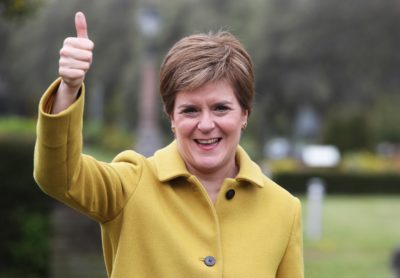Nicola Sturgeon has said she plans to hold a referendum on Scottish independence on 19 October 2023.
The Scottish first minister told MSPs this afternoon that she plans to hold a “legal, constitutional referendum”, ruling out an illicit vote that “would not lead to Scotland becoming independent” because the result would not be recognised.
She said that the ability of MSPs to authorise a referendum was “contested” and that “the Lord Advocate has agreed to make a reference of the provisions in the Bill to the Supreme Court.”
Sturgeon said that the “democratic way to proceed” would be for Westminster to issue a Section 30 order permitting a fresh vote.


In March 2017 Holyrood’s request for such an order was refused.
Sturgeon announced her plans to write to prime minster Boris Johnson later today to “make clear that I am ready and willing to negotiate the terms of a section 30 order with him”.
However she stressed that she was unwilling to: “allow Scottish democracy to be a prisoner of Boris Johnson or any prime minister.”
She argued that Scottish independence “cannot be suppressed” even if Johnson decides against issuing the order, which he has previously vowed to oppose.
The first minister argued that the 2016 vote to leave the European Union had “ripped” Scotland from the bloc against its will, and that a new indyref will permit Scotland to “chart our own course” adding that: “now is the time… to debate and decide the future of our country… now is the time for independence”.
She referred to stagnating growth and the costs of living crisis, arguing that Scotland’s place in the Union is “holding us back from fulfilling our potential”.
She also claimed to have a mandate for a new vote due to the SNP’s victory in last May’s elections, stating: “Last May the people of Scotland said yes to an independence referendum by electing a clear majority of MSPs committed to that outcome. The democratic decision was clear.”
Sturgeon said next year’s vote would be a consultative referendum, and that its status would be “exactly the same as the referendums of 1997, 2014 and 2016”.
She also confirmed that ballot papers would pose the same question as that of the 2014 vote: “Should Scotland be an independent country?”
This morning Tech minster Chris Philp argued that the 2014 result-in which over 55 per cent of Scots voted to remain part of the UK-ought to be respected given that the vote was intended as a “once in a generation” event.
Ahead of this afternoon’s address the Conservative MSP for Mid-Scotland & Fife, Murdo Fraser, slammed Sturgeon’s speech as “no more than a shameless attempt to divert attention away from the sex past scandal currently ripping apart her MP group at Westminster.”
SNP MP Patrick Grady is currently under investigation over allegations of sexual assault.
Douglas Ross, the leader of the Scottish Conservatives, on Sunday accused Sturgeon of “playing games” and told the BBC that there were more important problems to deal with than a fresh independence debate.
Quizzed over whether Labour backed Sturgeon’s plans shadow levelling up secretary Lisa Nandy accused the first minister of having “some brass neck”, arguing that what “she has done in the last 24 hours is nothing to do with the interests of Scotland it is to do with the interest of the SNP.
“She is launching an election bid. There are 700,000 people on waiting lists in Scotland for NHS treatment. If I were in charge in Scotland I would be looking very seriously at how to tackle that crisis. This is the thing that is keeping families in Scotland awake at night and she ought to be focusing on that,” Nandy stressed.

